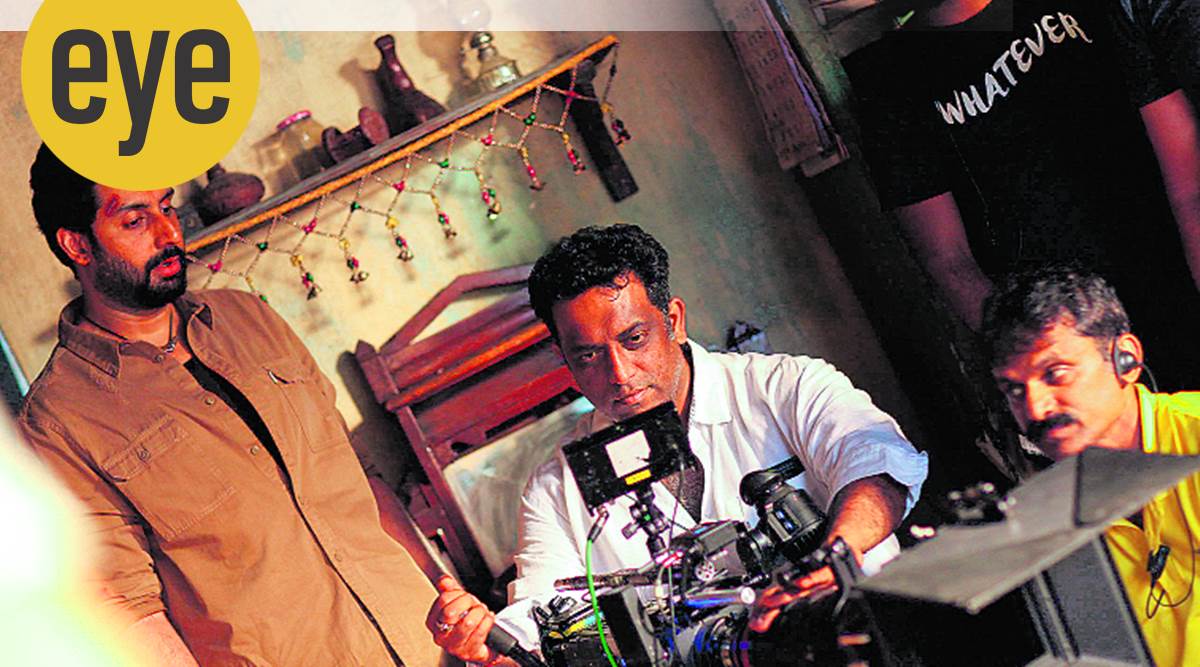 Anurag Basu (centre) with actor Abhishek Bachchan on the sets of Ludo, which released on Netflix on November 12.
Anurag Basu (centre) with actor Abhishek Bachchan on the sets of Ludo, which released on Netflix on November 12.Your movies often have a fairly large canvas. In Ludo, you seem to have expanded it further.
There was no conscious decision to make it big. When I am writing the script and visualising the characters, it becomes easier for me if I have a face to the characters. I imagined Abhishek (Bachchan) playing Bittu and Pankaj (Tripathi) as Sattu. Fortunately, they said yes.
Actors Sanya Malhotra and Bachchan have said that they came on board because you were directing it. What do you think accounts for your popularity?
I can’t say. Maybe, it’s my process or the atmosphere on the sets that they like.
They have also mentioned not knowing details of the script and scenes…
This could be my drawback. I don’t commit to a scene till the last minute even though my script is ready. You can’t write a complicated scene impromptu. However, I keep improvising on the sets, and, so, I don’t give it to the actors beforehand. After every film, I promise myself I won’t do this during my next film. It goes well during the first week. Then, I go back to my old ways. You write a script sitting in an air-conditioned room. When you go to the sets, everything affects your scene. You have to incorporate the ambience in the scene.
Have your initial years of directing TV shows shaped your process?
More than television, the way I orchestrate a scene owes a lot to theatre. I never assisted anyone. So, theatre is my only school.
What’s the story behind the beautiful use of the song O betaji…from Albela (1951), picturised on Bhagwan Dada, in Ludo?
When I was writing the script, I thought I would create a song like O betaji…for a scene featuring Pankaj. Later, I thought of using the original one and looked for its rights, which HMV had. It was always my favourite song from Albela. It’s delightful yet philosophical.
How does music influence your work?
Music is a part of my life. I can’t write without music playing in the background. I spend a lot of time educating myself about music — different genres and gharanas.
Tell us about your fascination with folk art, a glimpse of which we see in some of your movies, including in Ludo?
Wherever I can use them, I do. Maybe, one day, I will make a film set in North Bengal around folk art. My parents are theatre artistes and I was exposed to different kinds of art and theatre forms. I was also part of a folk art group in Chhattisgarh. The child in me comes alive when I see folk artistes.
How challenging was it to do justice to all the four stories in Ludo?
When you are conducting an orchestra, there is a risk that it might become a noise and not melody. I want the audience to enjoy the graph of the film and not look at it as four different stories. Yet, there is a beginning, middle and end in every story. Writing it was tough and took longer than usual.
In Ludo, you have also got credit for cinematography…
While working on television shows, I used to handle both cinematography and direction. I moved to Mumbai with the ambition of becoming a cameraman. I handled cinematography for Barfi! (2012) and Jagga Jasoos (2017), though I did not take care of it fully. The cinematographers I work with were busy. So, I thought I would shoot Ludo.
Do multiple narratives fascinate you? Life…in a Metro (2007) was a triptych, too.
I like it when a movie is not restricted to one particular genre. When you are juggling with so many genres, there is never a dull moment. You follow one character, then another.
You rose through the ranks to be counted as a successful filmmaker. How do you look back at your journey?
The industry is a fair place — I’m the biggest example of it. After coming to the city, my aim was to direct a television show. Then, I wanted to make a successful show. When the industry gives you a break, grab it and prove yourself to get another chance. Prove yourself again to get the third chance.
How did you recoup after Jagga…?
I was under-confident and started questioning my decisions. Eventually, the film reached the age-group it was made for — teenagers. Because of the digital platforms, the kind of response I am getting today has restored my confidence. Otherwise, I was considering rewiring myself.
How do you keep yourself afloat through the ups and downs?
As long as you are good at your work, the box-office result of a movie doesn’t affect your career. People will judge you by how serious you are about your job. There are, however, instances of people suffering a setback because their last film didn’t work.